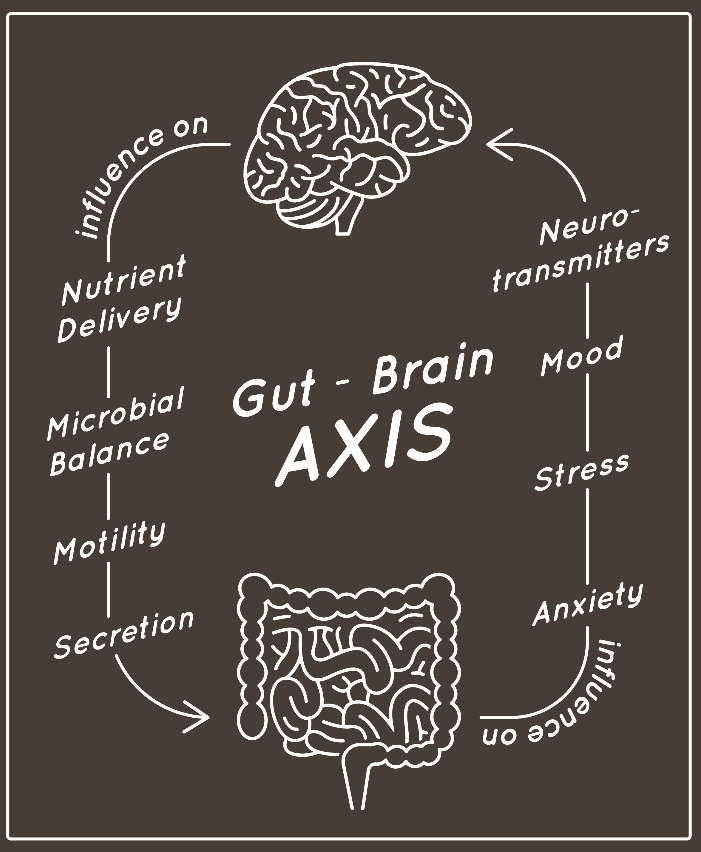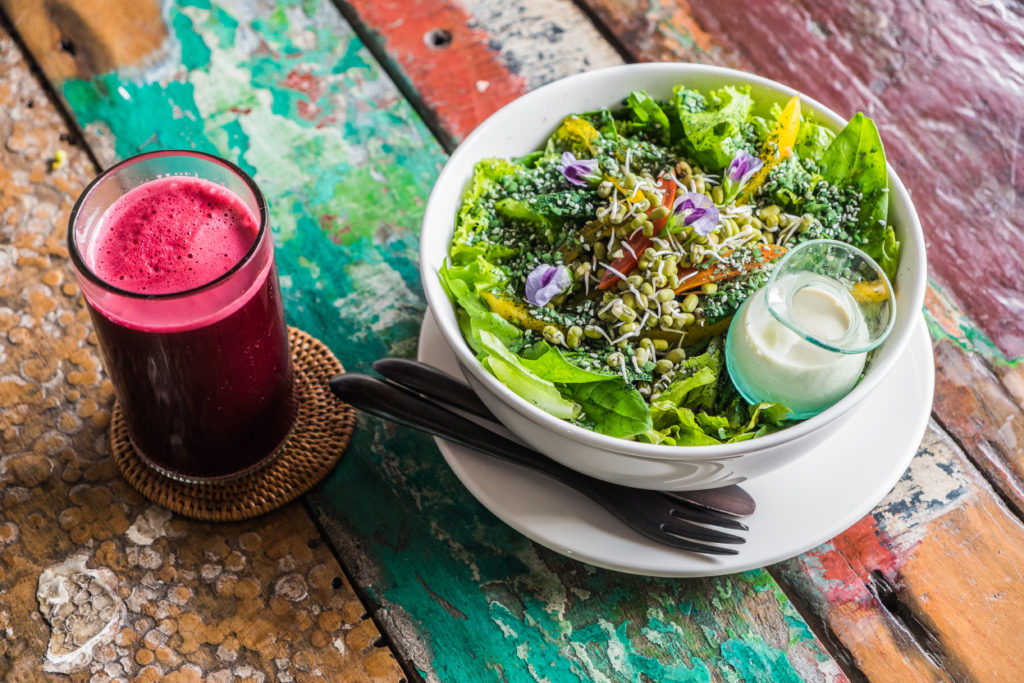Fascinating nutrition info. to assist w/better mental health
In honor of next month being mental health awareness month, I feel compelled to share a powerful and exciting groundbreaking study that just astonished me. And something else coincidently that was quite fascinating to me (possible nutrient deficiency) that might be a missing link for some people…I’m a nutritionist so this piece of the pie comes from that perspective. If you know anyone this may empower, please feel free to pass it along!

Recently a study was published in ‘Nature Structural & Molecular Biology’, that shows gut bacteria influences brain function at a deeper significant level than genetics – yes, more so than what experts initially realized. I know we have all heard of the gut-brain connection, but stay with me, it gets more profound! What I understand from some of the summaries is that researchers believe that what we eat influences the gut bacteria to “literally” chemically modify brain proteins which can directly shape the neural pathways linked to memory, learning, mood, inflammation, mental resilience, and much more. The process is called glycosylation that has been overlooked in history. This potentially means that what you eat to support your microbiome could be just as important as your DNA in determining cognitive health along with other body & brain mechanisms. It shapes how your brain functions. So no, gut health is not just a trend on TikTok, it is a biological necessity for peak body & mind performance! This is one of the summaries. – https://www.labroots.com/trending/cell-and-molecular-biology/28553/gut-bacteria-modify-brain-proteins/amp I have something else to share. There is a nutrient that our body cannot produce on its own, making it imperative we get it through our diet…please read on.
This fascinated me: I came across information a few years ago coincidently that there is this phenomenal connection with Folate (and other nutrients) being significantly tied to mental health. What I learned was that low folate levels, or folate deficiency, have been linked to an increased risk of depression (mild to severe) and may even contribute to a less-than-ideal response to antidepressant medication. What? Not having enough folate may contribute to a poor response to medication? Does that mean folate acts as a neurotransmitter? No, but it is essential for the “synthesis” to key neurotransmitters (serotonin, dopamine, etc.) making it essential for brain function and mood regulation. Basically, it helps the “formation” of neurotransmitters. So, this can help with things like brain fog, fatigue, mood disorders, sleep issues, etc. Yes, there are other pillars of life that need to be reviewed, but like I said – the intent of my blog is from the nutrition perspective. Stay with me…because it’s wild to think about something so simple might be a missing link for some. Think about this – doctors make folate or folic acid intake a crucial priority for expecting mothers (including supplementing before pregnancy). This is to reduce the risk of birth defects of the brain and spine in their developing baby among other things. But we forget that as humans in general, we NEED it for life. The human body cannot produce folate (and other ‘essential’ nutrients) on its own, making it necessary to obtain it through diet (or sometimes by supplements). Folate is responsible for many other mechanisms in the body such as the responsibility of red blood cell formation, etc., etc.
Supplementation: Of course, we should try to consume this amazing nutrient naturally daily through our food first the best we can. I’ll list some of the highest concentrations of folate in foods in a second along with a recipe you could consider. It’s also important to note that if you and your doctor think you should consider supplementation, you may need a “methylated” version of folic acid instead. Folic acid is the synthetic version of folate. There is a large percentage of our population that cannot “methylate” on their own a folic acid supplement effectively, resulting in deficiency despite consuming. Please read this article to learn more: https://draxe.com/health/methylation/ This is also a helpful methylation education video: https://www.youtube.com/watch?v=qSBhVlOqIIo Yes, methylated supplements are also easy to find nowadays. Please also note that folate deficiency usually coexists with other nutrient deficiencies because of its strong association with poor diet, alcoholism, malabsorptive disorders, and even certain medications, etc. Folate that is “naturally occurring” in food/beverages is not harmful. However, you should not consume folate in supplements, and/or fortified foods/beverages in amounts above the recommended upper limit, unless advocated by your health care provider. High intakes might mask a vitamin B12 deficiency until its neurological consequences become irreversible, eek. Most older adults (despite diet) and some others should likely supplement B12 as well (topic for another day). The appropriate amount of folate may even help decrease the chances of some cancer(s), but supplementing in high doses may contribute to a carcinogenic effect along with other issues. Like anything, it is a balance. Food first! How much? Link here – https://ods.od.nih.gov/factsheets/Folate-Consumer/

Foods that are higher in folate among other important nutrients:
Edamame, Lentils (about 90% of DV), asparagus, spinach, kale, broccoli, Brussel sprouts, avocados, mangos, oranges, lemons, grapefruit, beets, flaxseeds, walnuts, roasted peanuts, eggs, and many more! Here is an easy recipe to consider to nourish your body and mind!
Super Green Berry (folate rich) Smoothie
(adjust portions as needed)
• 1 Handful of Kale
• 1 Handful of Spinach
• 1 Banana (frozen makes it yummier)
• ½ Orange
• 1-2 Cups of Frozen Berries (strawberries, blackberries, blueberries, etc.)
• 1 Tbsp Ground Flaxseed
• 1 Tbsp Chia Seeds
• ¼ Cup of Cooked Sweet Potato (Optional) or ¼ Cup of Oats or ¼ cup (df) Yogurt
• ½ Can of Lentils (trust me) or Black beans (they hide well, promise), if you “just can’t”, add your favorite scoop of protein. Check out Truvani Protein! Super clean!
• Start w/1 Cup of water/or plant-based milk and ice (optional). Add more as you blend to determine your desired thickness!
Note: If your taste buds are used to a sweeter taste, you can consider adding pitted dates to this as well to naturally sweeten it more. Remember, it is more about satisfying our bodily needs, not our taste buds per sei. Think of it as taking your vitamins in some form…
Lastly check this snippet I copied/pasted from this study. Are you getting enough folate and other nutrients? https://pmc.ncbi.nlm.nih.gov/articles/PMC10490031/
“Psychiatry is currently facing a significant moment where the prevailing model, which primarily relies on pharmacological interventions, has only provided limited improvements in addressing the global burden of mental health issues [34]. Recognizing the complexity of mental health determinants, there is an increasing body of compelling evidence highlighting the critical role of nutrition in the prevalence and development of mental disorders. This suggests that diet is just as crucial to psychiatry as it is to other medical specialties such as cardiology, endocrinology, and gastroenterology [35]. This recognition underscores the importance of considering nutritional factors in the context of mental health and expanding the scope of psychiatric practice to incorporate dietary interventions [36]. There is growing evidence suggesting that suboptimal nutrition plays a role in the development and progression of behavioral health disorders, and it can also hinder the effectiveness of treatment and recovery [37]. The underlying pathology of depression may be influenced by suboptimal nutrition due to the crucial role that nutrients play in the functioning of the neuroendocrine system. Various nutrients, such as tryptophan, vitamin B6, vitamin B12, folic acid (folate), phenylalanine, tyrosine, histidine, choline, and glutamic acid, are essential for the synthesis of neurotransmitters like serotonin, dopamine, and norepinephrine [37]. These neurotransmitters are involved in regulating mood, appetite, and cognition, thus highlighting the importance of adequate nutrient intake for optimal mental health [38,39,40].”
Like anything, there are many other things to consider as the above are just some highlights and do not cover every little thing one would need to consider from a nutritional standpoint. Focusing on a variety of nutritious whole foods is ideal in general for anyone. As a Holistic Nutritionist I love sharing things I have come across as it relates to food to help our beautiful life. There are other “essential” nutrients that we need for brain and body health besides the highlighted folate, especially but not limited to Vitamin D, omega-3 fatty acids, fiber, amino acids, iodine, etc., And, avoiding things like ultra-processed foods and drinks, especially any with artificial colors, sugars, and other ingredients that have been proven to manipulate the gut bacteria. If you are interested in learning more to optimize general health and wellbeing, check out my link to my nutrition guide here: https://www.ironlegionstrengthco.com/product-page/coach-aj-s-holistic-nutrition-self-help-guide
If you like documentaries: These are so fascinating!
-The Gut our Second Brain
-The Brain that Changes Itself
-The Plastic Fantastic Brain-Rewiring the Mind
Remember, always stay in touch with your healthcare providers to ensure you are on the right track before adjusting any lifestyle components. Please see the disclaimer below. Keep learning, growing, and strive for the best vibes and health you can! Never give up!
Disclaimer: These are general tips and are not meant to replace medical or psychological health care needs. You may choose to follow or disregard any suggested guidance offered and that your decisions regarding your health and wellness are ultimately your own responsibility and the information provided is not to be taken as absolute. If for any reason you feel you need medical attention, reach out to your medical provider ASAP. If you feel you are having a crisis, call 911 or your local emergency service or go to your nearest emergency facility. Individuals experiencing a mental health crisis have access to a team of professionals by visiting The Opportunity Alliance Facility or calling 774-HELP (4357). These professionals are trained to respond to mental health crises 24 hours/day. This information is not intended and should not be construed as dispensing medical advice or claim to diagnose, treat, prevent, mitigate, prescribe, or cure any diseases, conditions, mental, physical, real or imaginary and that it is not a substitute for regular medical or psychological care. AJ Macomber is not a Medical Doctor, Practitioner, or a Licensed Registered Dietitian (see the about me page for credentials). AJM is not here for medical diagnostics, treatment procedures, or nutrition therapy. Everyone should seek medical advice and be closely monitored by their medical physician/provider before starting or continuing any lifestyle changes such as but not limited to dietary changes, supplemental changes, or physical activity changes, especially if one may be pregnant, or have any pre-existing injuries or medical conditions.
References: See above for imbedded links, and also https://www.mayoclinic.org/drugs-supplements-folate/art-20364625


